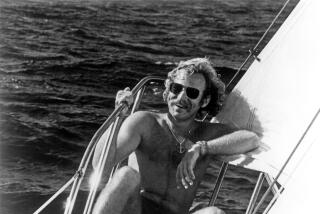‘Sea Change’ at 10: Celebrating Beck’s great 2002 break-up record
- Share via
If you’re like me, there’s a good chance you read the above headline and thought, “Has it really been 10 years since that happened?” And maybe you’re thinking about not only Beck’s “Sea Change,” first released Sept. 24, 2002, but the circumstances that made it the perfect salve for heartbreak that year.
And if that’s the case, by the time you get to the first chorus of the first song on the record, “The Golden Age,” difficult emotions have arisen that you thought you’d long since resolved. Even now, 10 years later and for very specific reasons, the song’s chorus -- “These days I barely get by / I don’t even try” -- makes my lip quiver and my heart hurt.
Maybe it’s just me, but based on conversations I’ve had over the years about “Sea Change,” there were a lot of breakups going on in the summer of 2002. The “Sea Change” of the title was experienced that year as couples endured disappointment and heartache, cheated on those they loved or felt jealousy and contempt. Yes, these things are happening all the time, but the calm, oft-wrenching storm that is “Sea Change” seemed to manifest a moment.
Its tone captured a historical moment, as well, coming as it did just after the first anniversary of the Sept. 11 attacks, when the country was enduring a different kind of heartbreak. Beck recorded it March of ’02 at Ocean Way Studios at Sunset and Gower in Hollywood, six months after the planes crashed into the towers and anthrax-laced letters put the country on edge. A week after “Sea Change” came out, a man and a teenager began shooting random drivers in sniper attacks around Washington, D.C. This was not a pleasant time.
The moment felt like the end of something, but, in hindsight, the beginning of something else. That feeling of loss coupled with a touch of minor-key hope is all over “Sea Change.” Beck captures it on “Guess I’m Doing Fine”: “It’s only lies that I’m living / It’s only tears that I’m crying / It’s only you that I’m losing / I guess I’m doing fine.” The redemption is within the arrangements, by Beck’s father David Campbell, which levitate the album’s structures with strings.
“Sea Change” was also a profound musical shift for Beck, who’d released the funky, R&B-influenced; “Midnite Vultures” in 1999, expressing a levity and playfulness with Prince-informed jams. But in the interim, he had endured a breakup with his longtime girlfriend, which drove him in a different direction. He’d made melancholy music before, of course, especially on “Mutations,” but the circumstances dictated a full record of such sadness, a world inhabited by people with sorry eyes that “cut through bones,” of narrators who have “seen the love you have turn to hate.”
I couldn’t listen to “Sea Change” for much of the mid-’00s (and I still find it hard to listen to the other breakup album that killed me that year, Elvis Costello’s under-appreciated “When I Was Cruel”). The record dredged up a lot of emotional gunk, and put a pit in my stomach that still returns nearly every time I hear “Lost Cause,” or “Sunday Sun,” or “It’s All in Your Mind” -- ghosts of emotions that only music can resurrect.
Ten years is a long time, but when it comes to memories and music, the months and years can vanish with the arrival of a single melody, or one of Beck’s perfect lyrical moments: “The sun don’t shine even when it’s day / You gotta drive all night just to feel like you’re OK.” Time passes, thank God.
ALSO:
Ke$ha releases new single, ‘Die Young,’ sets album date
FIDLAR writes anthem for Cha Cha Lounge, now we need a drink
Critic’s notebook: Green Day’s ‘¡Uno!’ is, No. 1, overly commercial
Follow Randall Roberts on Twitter: @liliedit
More to Read
The biggest entertainment stories
Get our big stories about Hollywood, film, television, music, arts, culture and more right in your inbox as soon as they publish.
You may occasionally receive promotional content from the Los Angeles Times.










